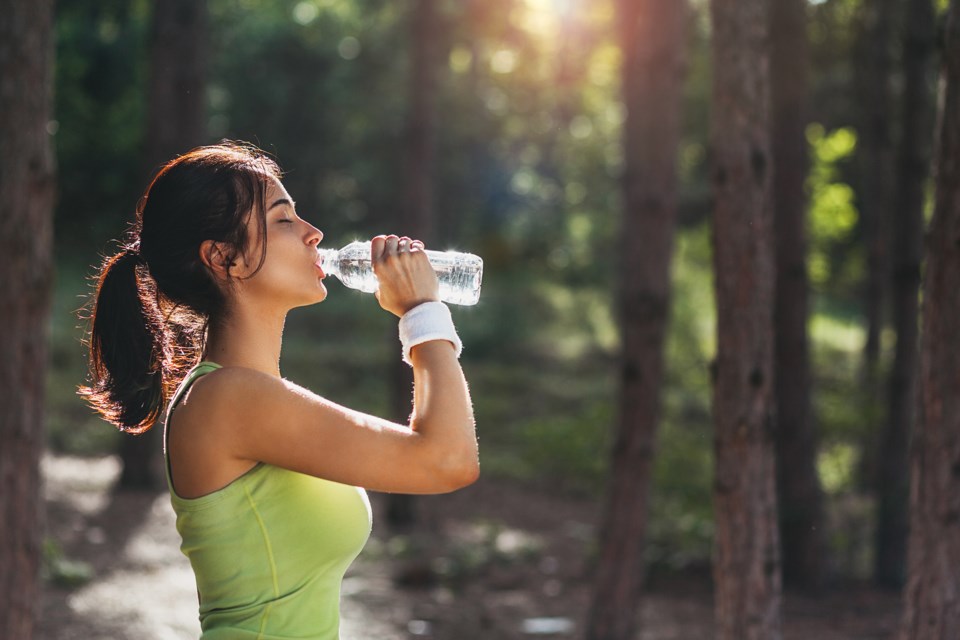This article, written by Scott Lear, Simon Fraser University, originally appeared on The Conversation and is republished here with permission:
With a kilometre to go, triathlete Sarah True was pulled from the 2019 Ironman European Championship in Frankfurt, Germany, due to heat exhaustion. She was in the lead by seven minutes after having swum, biked and run nearly 225 kilometres. The temperature was 38C.
With summer comes longer days and sunnier skies. It’s an opportunity to shed our winter clothes and get outside to go for a run, get on a bike or play pick-up sports with friends. Indeed, summer is when we are most active.
The other thing that comes with summer is heat and humidity. As Europe and North America grapple with recurring summer heatwaves, we all need to take care when being active in the summer heat.
The work of sweat and blood
When we exercise, our body’s core temperature increases. To combat this, we have a number of built-in cooling methods. The main way our body cools itself is through the evaporation of sweat on our skin. For sweat to evaporate it needs to absorb heat. That absorption of heat cools us down.
In addition to sweat, blood is diverted to our skin’s surface to cool and recirculate throughout our body. It’s the reason why many of us become flushed in the face when we’re active.
How much each of these two methods contributes to cooling can vary from person to person. Some people are profuse sweaters while others turn red and hardly sweat at all.
The effectiveness of our body’s cooling also depends on the ambient conditions. The drier the conditions, the more effective sweat is at cooling us. But in high humidity, the air is saturated with water vapour causing our sweat to drip ineffectively off our body. In these situations, our body continues to produce more sweat in the hopes of cooling off.
Exercising in hot weather adds stress to our body. Diverting blood to our skin to cool means less blood (and oxygen) going to the working muscles.
Sweating also reduces the amount of water in our body and if this lost fluid is not replenished, blood volume goes down. This can lead to lower blood pressure and increased heart rate. At the very least, this results in a decrease in performance. At the extreme end, it can lead to heat exhaustion and heat stroke as happened to Sarah True.
Symptoms can include exhaustion, fatigue, poor mental functioning (dizziness, confusion, irritability), nausea, vomiting and fainting. If severe heat exhaustion isn’t treated, it can lead to long-term disability and even death.
Young and elderly at greatest risk
Even though education and awareness has increased over the years, the prevalence of heat exhaustion may be on the rise. And with record high temperatures being broken year after year due to climate change, the environmental exposure and risk may continue to increase.
Those at the greatest risk are the very young, the elderly and those with pre-existing medical conditions. During Québec’s heatwave in 2018, an estimated 70 deaths were attributed to the heat. Most of the deaths were in these high risk groups.
In addition, outdoor sports that involve wearing or carrying heavy equipment such as football pose an increased risk. This is due to both the weight of the equipment and the layering which prevents sweat from evaporating.
Six tips to avoid heat exhaustion
When temperatures rise, a few simple precautions can help mitigate the risk:
-
Know the weather conditions beforehand.
-
Wear sunscreen and light clothing.
-
Drink fluids regularly.
-
Avoid exercising at peak hours of heat, or exercise in an air-conditioned gym.
-
If you’re travelling to a warmer climate, whether in the summer or winter, allow your body to get acclimatized by slowly increasing your activity.
-
If you are completing an athletic event during the day and you usually train during the early morning or evening, you should also acclimatize your body to the midday heat.
Scott Lear writes the weekly blog Feeling Healthy with Dr. Scott Lear.![]()
Scott Lear, Professor of Health Sciences, Simon Fraser University
This article is republished from The Conversation under a Creative Commons license. Read the original article.
